Ethics and Governance Essay: Ethical Implications of Iceland Foods Ad
VerifiedAdded on 2023/01/18
|10
|2725
|23
Essay
AI Summary
This essay analyzes the ethical considerations surrounding the ban of the Iceland Foods Christmas advertisement by Clearcast. The paper delves into the complexities of corporate governance, business ethics, and the impact of political or social commentary in advertising. It examines the arguments for and against the ban, considering the potential for political bias and the importance of self-restraint for businesses when engaging in public discourse. The essay explores the perspectives of various researchers, discussing the potential damage to a brand's reputation and the importance of media policies. It also considers the customer's perception of the brand, the impact of political views on employees, and the role of market surveys in shaping advertising strategies. Ultimately, the essay argues that the ban was justified, highlighting the potential for misinterpretation and the need for businesses to be mindful of their audience's diverse perspectives. The essay also discusses the influence of political advertising and how it has increased over the last decade. The essay concludes by emphasizing the need for businesses to carefully consider the potential outcomes of their advertising campaigns.
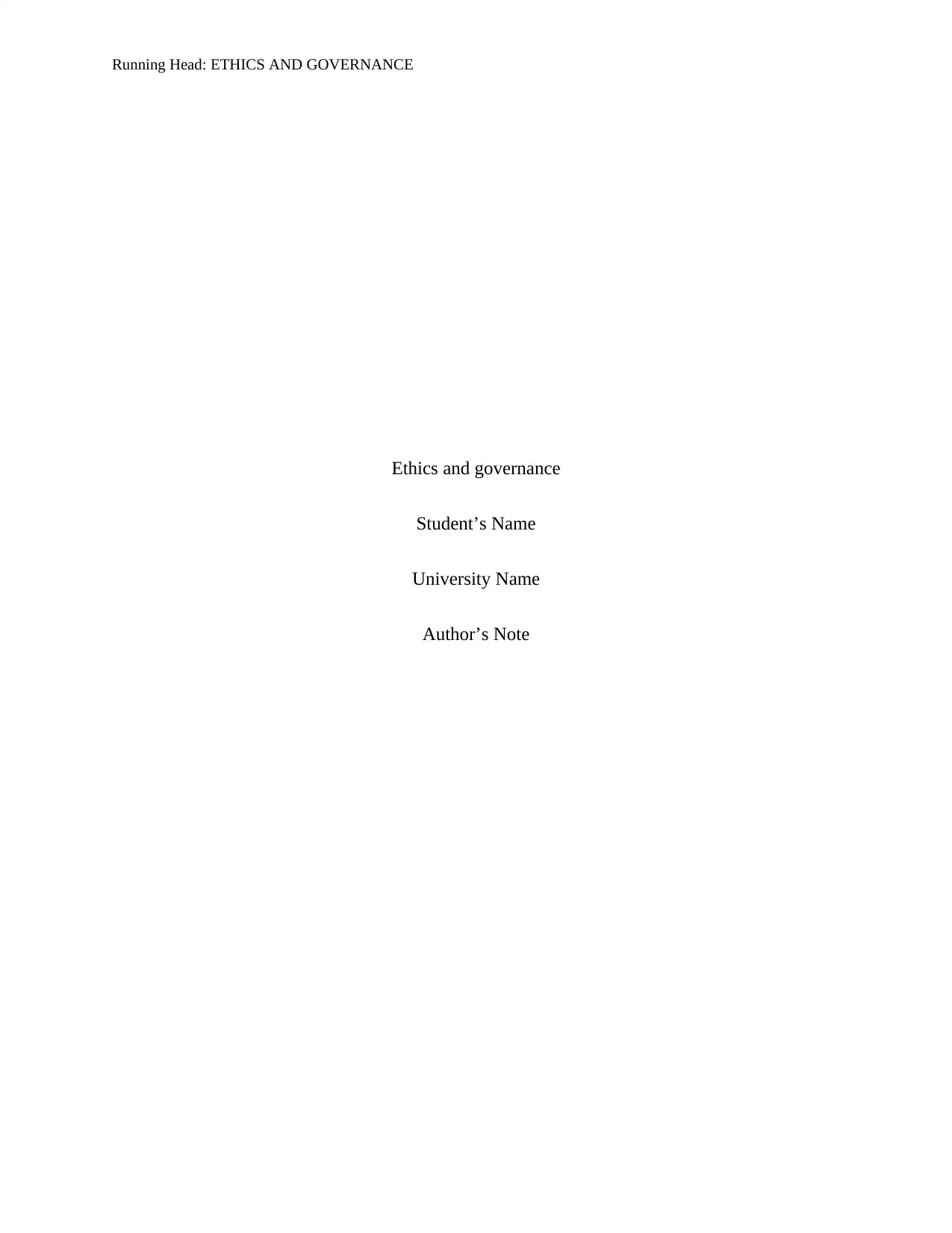
Running Head: ETHICS AND GOVERNANCE
Ethics and governance
Student’s Name
University Name
Author’s Note
Ethics and governance
Student’s Name
University Name
Author’s Note
Paraphrase This Document
Need a fresh take? Get an instant paraphrase of this document with our AI Paraphraser
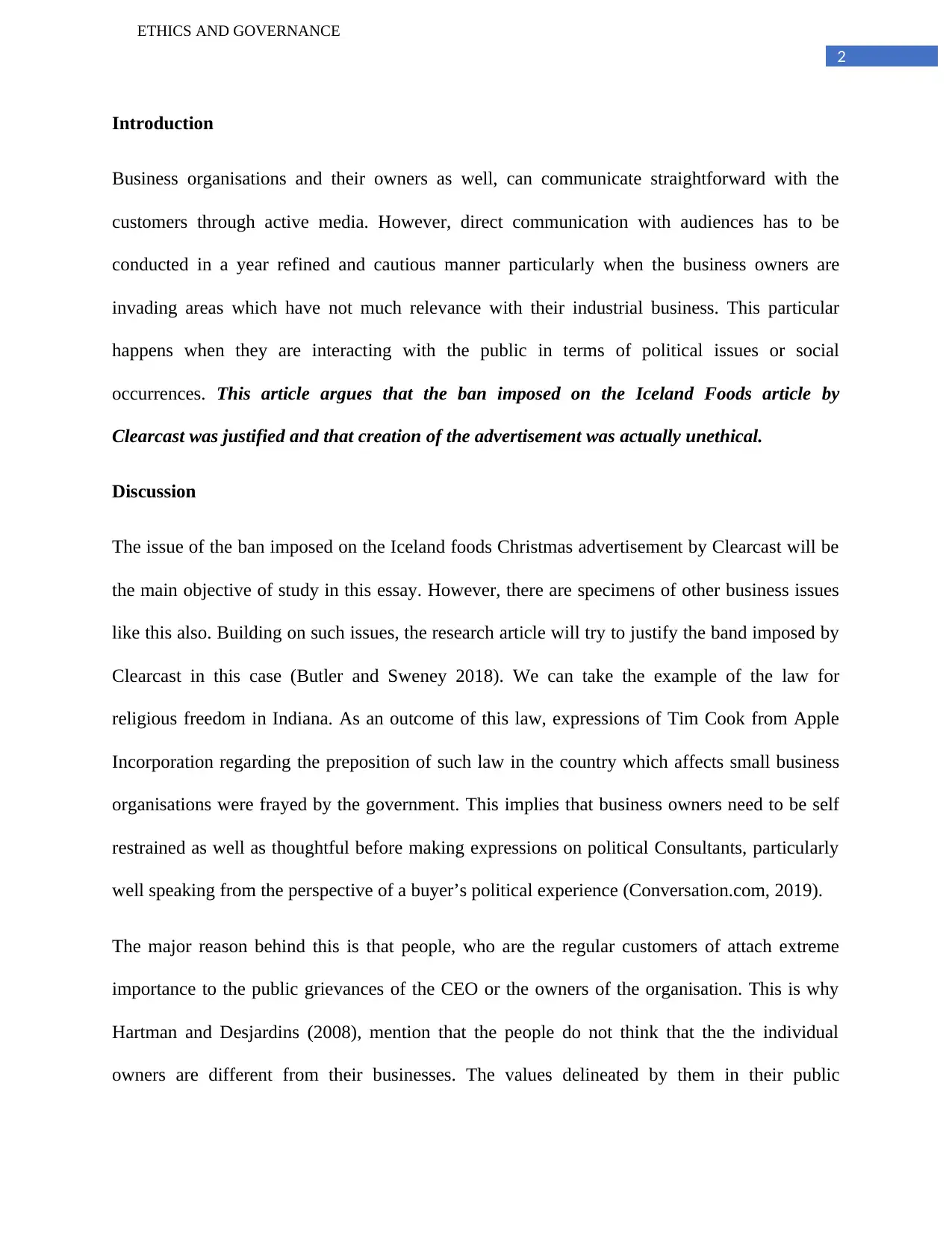
2
ETHICS AND GOVERNANCE
Introduction
Business organisations and their owners as well, can communicate straightforward with the
customers through active media. However, direct communication with audiences has to be
conducted in a year refined and cautious manner particularly when the business owners are
invading areas which have not much relevance with their industrial business. This particular
happens when they are interacting with the public in terms of political issues or social
occurrences. This article argues that the ban imposed on the Iceland Foods article by
Clearcast was justified and that creation of the advertisement was actually unethical.
Discussion
The issue of the ban imposed on the Iceland foods Christmas advertisement by Clearcast will be
the main objective of study in this essay. However, there are specimens of other business issues
like this also. Building on such issues, the research article will try to justify the band imposed by
Clearcast in this case (Butler and Sweney 2018). We can take the example of the law for
religious freedom in Indiana. As an outcome of this law, expressions of Tim Cook from Apple
Incorporation regarding the preposition of such law in the country which affects small business
organisations were frayed by the government. This implies that business owners need to be self
restrained as well as thoughtful before making expressions on political Consultants, particularly
well speaking from the perspective of a buyer’s political experience (Conversation.com, 2019).
The major reason behind this is that people, who are the regular customers of attach extreme
importance to the public grievances of the CEO or the owners of the organisation. This is why
Hartman and Desjardins (2008), mention that the people do not think that the the individual
owners are different from their businesses. The values delineated by them in their public
ETHICS AND GOVERNANCE
Introduction
Business organisations and their owners as well, can communicate straightforward with the
customers through active media. However, direct communication with audiences has to be
conducted in a year refined and cautious manner particularly when the business owners are
invading areas which have not much relevance with their industrial business. This particular
happens when they are interacting with the public in terms of political issues or social
occurrences. This article argues that the ban imposed on the Iceland Foods article by
Clearcast was justified and that creation of the advertisement was actually unethical.
Discussion
The issue of the ban imposed on the Iceland foods Christmas advertisement by Clearcast will be
the main objective of study in this essay. However, there are specimens of other business issues
like this also. Building on such issues, the research article will try to justify the band imposed by
Clearcast in this case (Butler and Sweney 2018). We can take the example of the law for
religious freedom in Indiana. As an outcome of this law, expressions of Tim Cook from Apple
Incorporation regarding the preposition of such law in the country which affects small business
organisations were frayed by the government. This implies that business owners need to be self
restrained as well as thoughtful before making expressions on political Consultants, particularly
well speaking from the perspective of a buyer’s political experience (Conversation.com, 2019).
The major reason behind this is that people, who are the regular customers of attach extreme
importance to the public grievances of the CEO or the owners of the organisation. This is why
Hartman and Desjardins (2008), mention that the people do not think that the the individual
owners are different from their businesses. The values delineated by them in their public
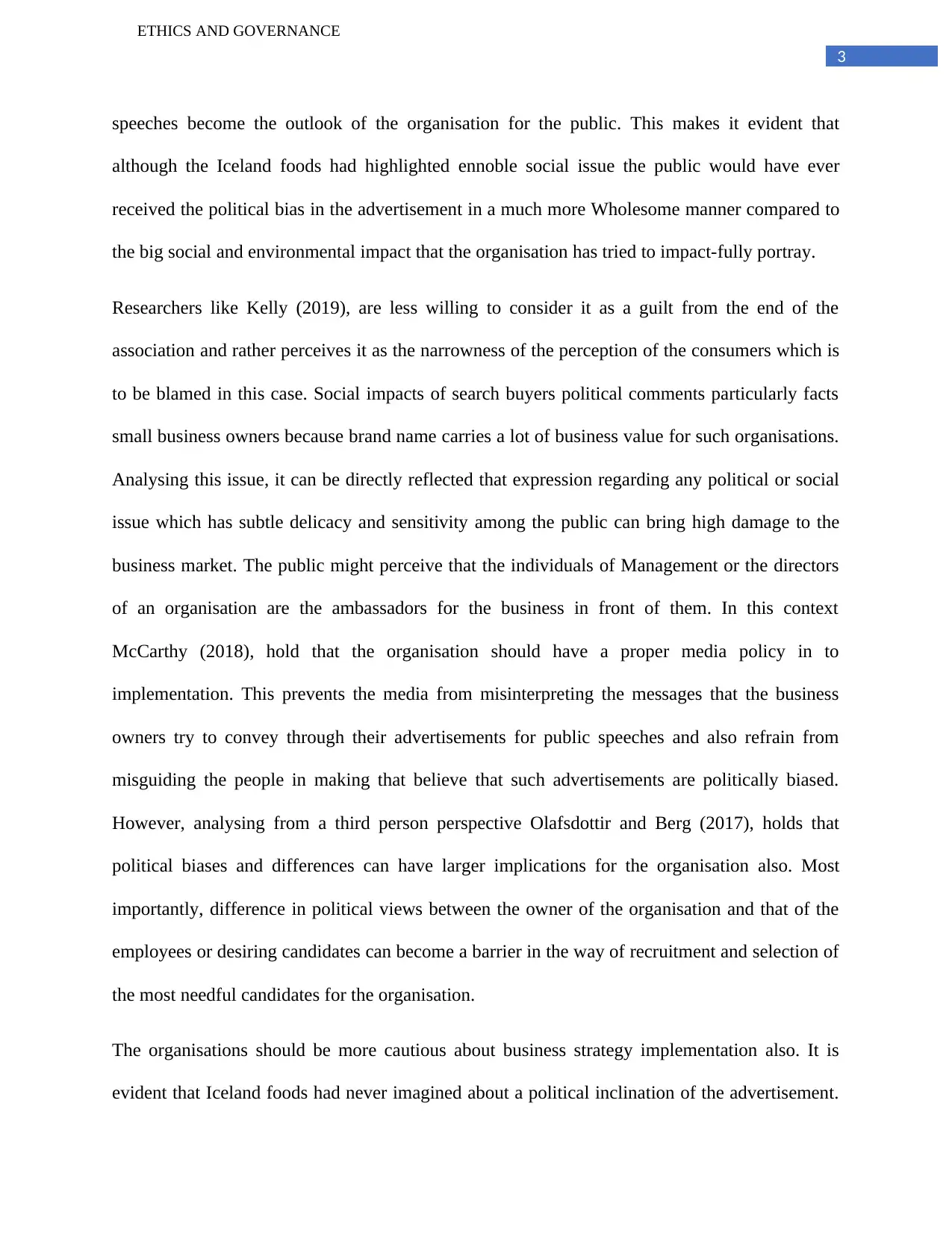
3
ETHICS AND GOVERNANCE
speeches become the outlook of the organisation for the public. This makes it evident that
although the Iceland foods had highlighted ennoble social issue the public would have ever
received the political bias in the advertisement in a much more Wholesome manner compared to
the big social and environmental impact that the organisation has tried to impact-fully portray.
Researchers like Kelly (2019), are less willing to consider it as a guilt from the end of the
association and rather perceives it as the narrowness of the perception of the consumers which is
to be blamed in this case. Social impacts of search buyers political comments particularly facts
small business owners because brand name carries a lot of business value for such organisations.
Analysing this issue, it can be directly reflected that expression regarding any political or social
issue which has subtle delicacy and sensitivity among the public can bring high damage to the
business market. The public might perceive that the individuals of Management or the directors
of an organisation are the ambassadors for the business in front of them. In this context
McCarthy (2018), hold that the organisation should have a proper media policy in to
implementation. This prevents the media from misinterpreting the messages that the business
owners try to convey through their advertisements for public speeches and also refrain from
misguiding the people in making that believe that such advertisements are politically biased.
However, analysing from a third person perspective Olafsdottir and Berg (2017), holds that
political biases and differences can have larger implications for the organisation also. Most
importantly, difference in political views between the owner of the organisation and that of the
employees or desiring candidates can become a barrier in the way of recruitment and selection of
the most needful candidates for the organisation.
The organisations should be more cautious about business strategy implementation also. It is
evident that Iceland foods had never imagined about a political inclination of the advertisement.
ETHICS AND GOVERNANCE
speeches become the outlook of the organisation for the public. This makes it evident that
although the Iceland foods had highlighted ennoble social issue the public would have ever
received the political bias in the advertisement in a much more Wholesome manner compared to
the big social and environmental impact that the organisation has tried to impact-fully portray.
Researchers like Kelly (2019), are less willing to consider it as a guilt from the end of the
association and rather perceives it as the narrowness of the perception of the consumers which is
to be blamed in this case. Social impacts of search buyers political comments particularly facts
small business owners because brand name carries a lot of business value for such organisations.
Analysing this issue, it can be directly reflected that expression regarding any political or social
issue which has subtle delicacy and sensitivity among the public can bring high damage to the
business market. The public might perceive that the individuals of Management or the directors
of an organisation are the ambassadors for the business in front of them. In this context
McCarthy (2018), hold that the organisation should have a proper media policy in to
implementation. This prevents the media from misinterpreting the messages that the business
owners try to convey through their advertisements for public speeches and also refrain from
misguiding the people in making that believe that such advertisements are politically biased.
However, analysing from a third person perspective Olafsdottir and Berg (2017), holds that
political biases and differences can have larger implications for the organisation also. Most
importantly, difference in political views between the owner of the organisation and that of the
employees or desiring candidates can become a barrier in the way of recruitment and selection of
the most needful candidates for the organisation.
The organisations should be more cautious about business strategy implementation also. It is
evident that Iceland foods had never imagined about a political inclination of the advertisement.
⊘ This is a preview!⊘
Do you want full access?
Subscribe today to unlock all pages.

Trusted by 1+ million students worldwide
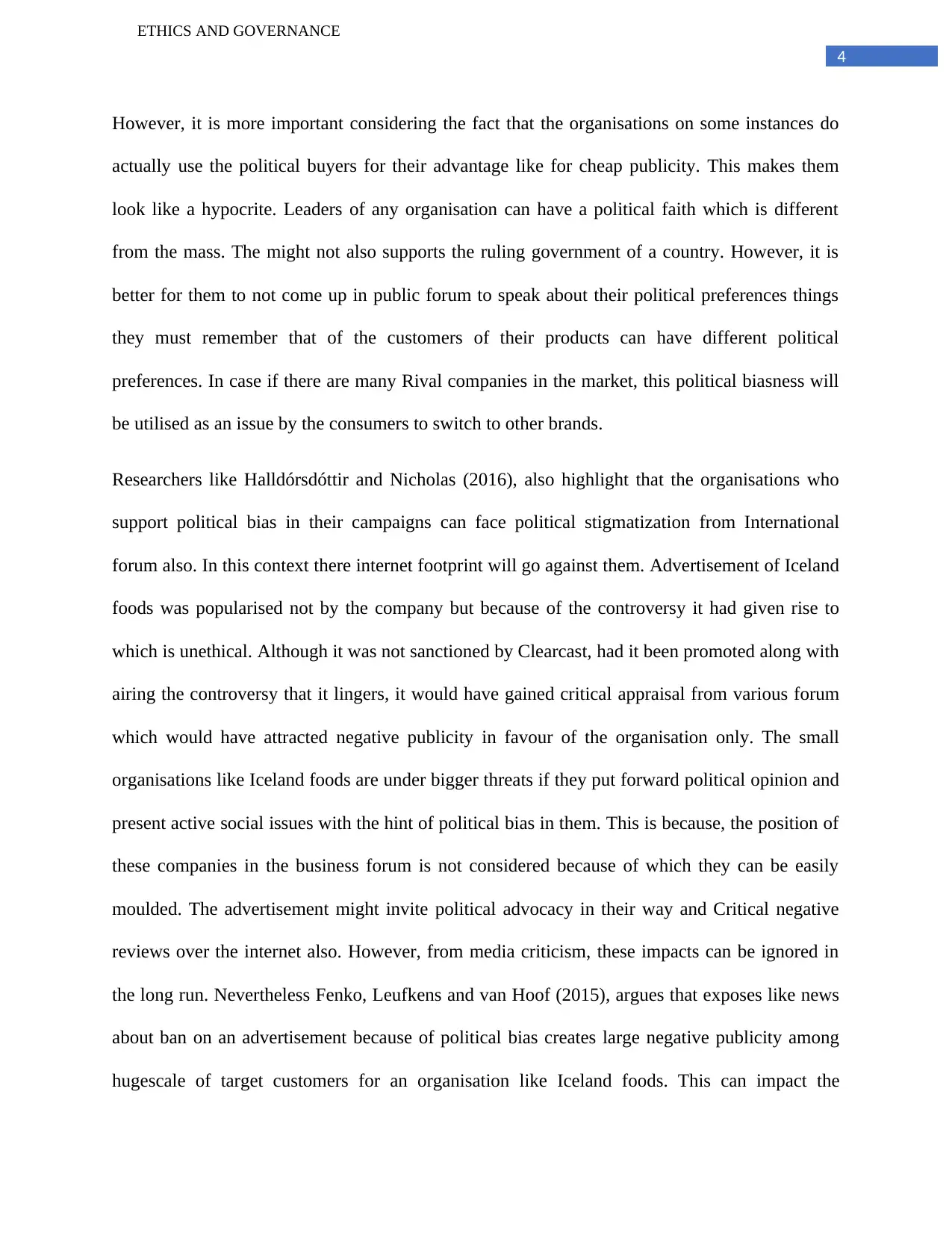
4
ETHICS AND GOVERNANCE
However, it is more important considering the fact that the organisations on some instances do
actually use the political buyers for their advantage like for cheap publicity. This makes them
look like a hypocrite. Leaders of any organisation can have a political faith which is different
from the mass. The might not also supports the ruling government of a country. However, it is
better for them to not come up in public forum to speak about their political preferences things
they must remember that of the customers of their products can have different political
preferences. In case if there are many Rival companies in the market, this political biasness will
be utilised as an issue by the consumers to switch to other brands.
Researchers like Halldórsdóttir and Nicholas (2016), also highlight that the organisations who
support political bias in their campaigns can face political stigmatization from International
forum also. In this context there internet footprint will go against them. Advertisement of Iceland
foods was popularised not by the company but because of the controversy it had given rise to
which is unethical. Although it was not sanctioned by Clearcast, had it been promoted along with
airing the controversy that it lingers, it would have gained critical appraisal from various forum
which would have attracted negative publicity in favour of the organisation only. The small
organisations like Iceland foods are under bigger threats if they put forward political opinion and
present active social issues with the hint of political bias in them. This is because, the position of
these companies in the business forum is not considered because of which they can be easily
moulded. The advertisement might invite political advocacy in their way and Critical negative
reviews over the internet also. However, from media criticism, these impacts can be ignored in
the long run. Nevertheless Fenko, Leufkens and van Hoof (2015), argues that exposes like news
about ban on an advertisement because of political bias creates large negative publicity among
hugescale of target customers for an organisation like Iceland foods. This can impact the
ETHICS AND GOVERNANCE
However, it is more important considering the fact that the organisations on some instances do
actually use the political buyers for their advantage like for cheap publicity. This makes them
look like a hypocrite. Leaders of any organisation can have a political faith which is different
from the mass. The might not also supports the ruling government of a country. However, it is
better for them to not come up in public forum to speak about their political preferences things
they must remember that of the customers of their products can have different political
preferences. In case if there are many Rival companies in the market, this political biasness will
be utilised as an issue by the consumers to switch to other brands.
Researchers like Halldórsdóttir and Nicholas (2016), also highlight that the organisations who
support political bias in their campaigns can face political stigmatization from International
forum also. In this context there internet footprint will go against them. Advertisement of Iceland
foods was popularised not by the company but because of the controversy it had given rise to
which is unethical. Although it was not sanctioned by Clearcast, had it been promoted along with
airing the controversy that it lingers, it would have gained critical appraisal from various forum
which would have attracted negative publicity in favour of the organisation only. The small
organisations like Iceland foods are under bigger threats if they put forward political opinion and
present active social issues with the hint of political bias in them. This is because, the position of
these companies in the business forum is not considered because of which they can be easily
moulded. The advertisement might invite political advocacy in their way and Critical negative
reviews over the internet also. However, from media criticism, these impacts can be ignored in
the long run. Nevertheless Fenko, Leufkens and van Hoof (2015), argues that exposes like news
about ban on an advertisement because of political bias creates large negative publicity among
hugescale of target customers for an organisation like Iceland foods. This can impact the
Paraphrase This Document
Need a fresh take? Get an instant paraphrase of this document with our AI Paraphraser
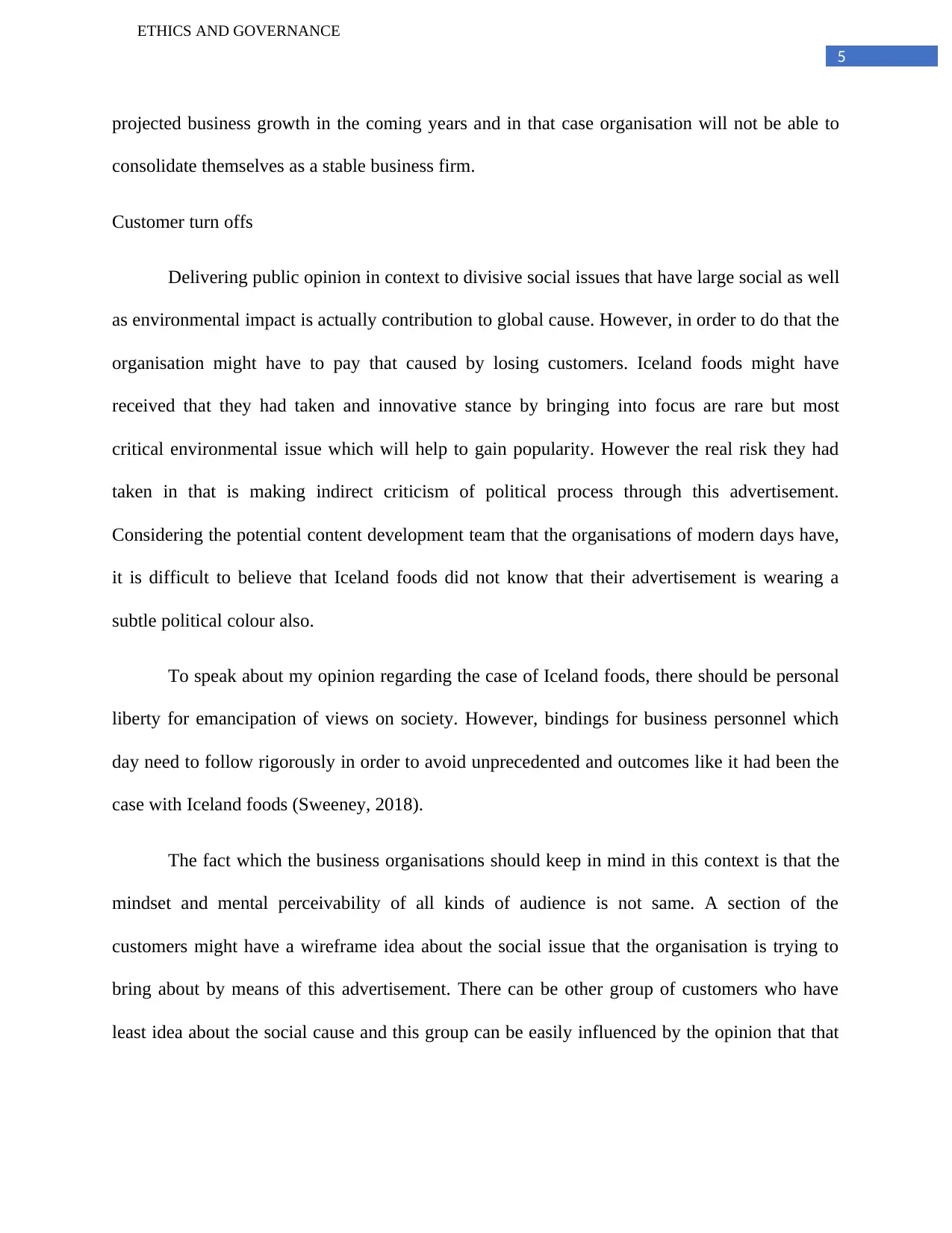
5
ETHICS AND GOVERNANCE
projected business growth in the coming years and in that case organisation will not be able to
consolidate themselves as a stable business firm.
Customer turn offs
Delivering public opinion in context to divisive social issues that have large social as well
as environmental impact is actually contribution to global cause. However, in order to do that the
organisation might have to pay that caused by losing customers. Iceland foods might have
received that they had taken and innovative stance by bringing into focus are rare but most
critical environmental issue which will help to gain popularity. However the real risk they had
taken in that is making indirect criticism of political process through this advertisement.
Considering the potential content development team that the organisations of modern days have,
it is difficult to believe that Iceland foods did not know that their advertisement is wearing a
subtle political colour also.
To speak about my opinion regarding the case of Iceland foods, there should be personal
liberty for emancipation of views on society. However, bindings for business personnel which
day need to follow rigorously in order to avoid unprecedented and outcomes like it had been the
case with Iceland foods (Sweeney, 2018).
The fact which the business organisations should keep in mind in this context is that the
mindset and mental perceivability of all kinds of audience is not same. A section of the
customers might have a wireframe idea about the social issue that the organisation is trying to
bring about by means of this advertisement. There can be other group of customers who have
least idea about the social cause and this group can be easily influenced by the opinion that that
ETHICS AND GOVERNANCE
projected business growth in the coming years and in that case organisation will not be able to
consolidate themselves as a stable business firm.
Customer turn offs
Delivering public opinion in context to divisive social issues that have large social as well
as environmental impact is actually contribution to global cause. However, in order to do that the
organisation might have to pay that caused by losing customers. Iceland foods might have
received that they had taken and innovative stance by bringing into focus are rare but most
critical environmental issue which will help to gain popularity. However the real risk they had
taken in that is making indirect criticism of political process through this advertisement.
Considering the potential content development team that the organisations of modern days have,
it is difficult to believe that Iceland foods did not know that their advertisement is wearing a
subtle political colour also.
To speak about my opinion regarding the case of Iceland foods, there should be personal
liberty for emancipation of views on society. However, bindings for business personnel which
day need to follow rigorously in order to avoid unprecedented and outcomes like it had been the
case with Iceland foods (Sweeney, 2018).
The fact which the business organisations should keep in mind in this context is that the
mindset and mental perceivability of all kinds of audience is not same. A section of the
customers might have a wireframe idea about the social issue that the organisation is trying to
bring about by means of this advertisement. There can be other group of customers who have
least idea about the social cause and this group can be easily influenced by the opinion that that
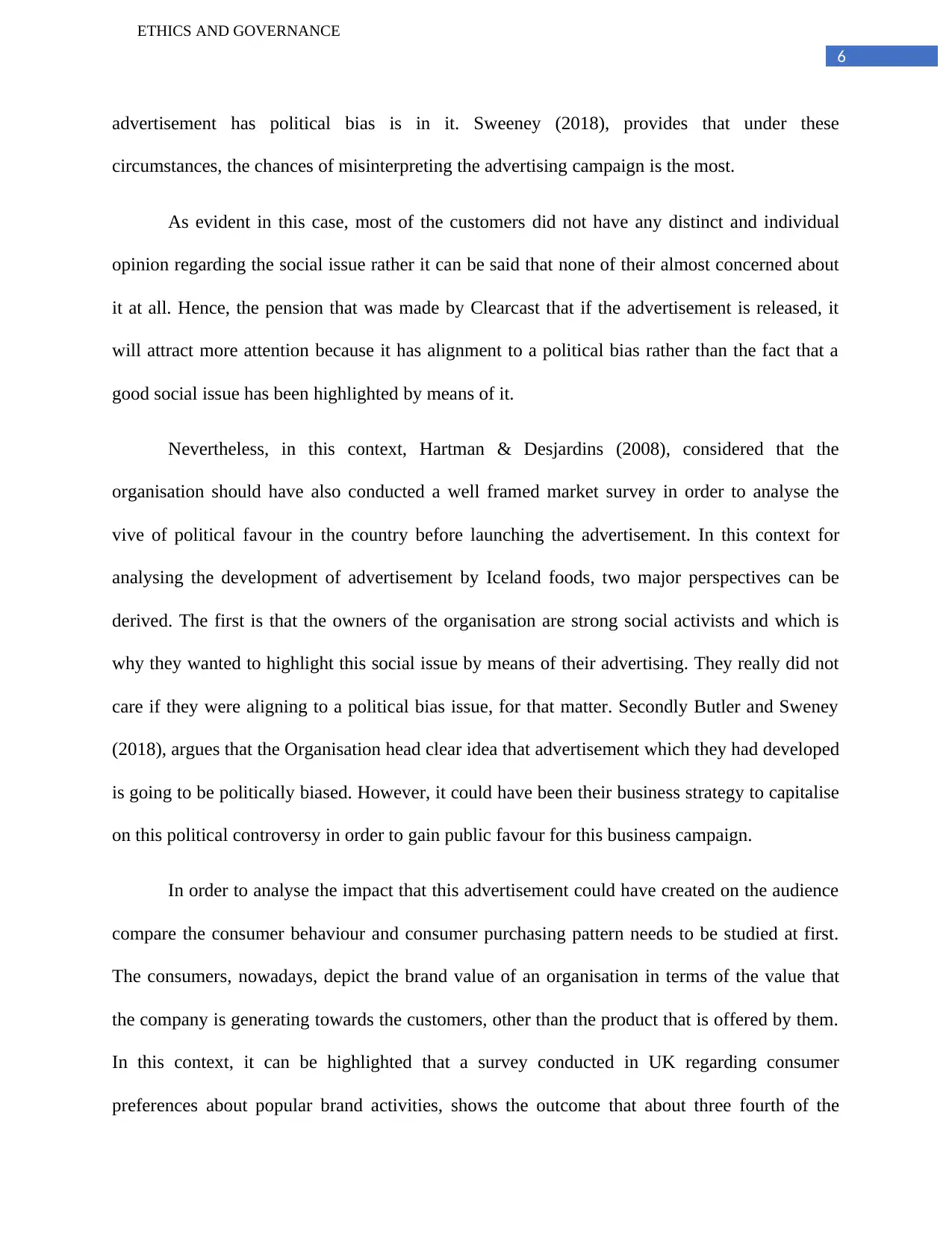
6
ETHICS AND GOVERNANCE
advertisement has political bias is in it. Sweeney (2018), provides that under these
circumstances, the chances of misinterpreting the advertising campaign is the most.
As evident in this case, most of the customers did not have any distinct and individual
opinion regarding the social issue rather it can be said that none of their almost concerned about
it at all. Hence, the pension that was made by Clearcast that if the advertisement is released, it
will attract more attention because it has alignment to a political bias rather than the fact that a
good social issue has been highlighted by means of it.
Nevertheless, in this context, Hartman & Desjardins (2008), considered that the
organisation should have also conducted a well framed market survey in order to analyse the
vive of political favour in the country before launching the advertisement. In this context for
analysing the development of advertisement by Iceland foods, two major perspectives can be
derived. The first is that the owners of the organisation are strong social activists and which is
why they wanted to highlight this social issue by means of their advertising. They really did not
care if they were aligning to a political bias issue, for that matter. Secondly Butler and Sweney
(2018), argues that the Organisation head clear idea that advertisement which they had developed
is going to be politically biased. However, it could have been their business strategy to capitalise
on this political controversy in order to gain public favour for this business campaign.
In order to analyse the impact that this advertisement could have created on the audience
compare the consumer behaviour and consumer purchasing pattern needs to be studied at first.
The consumers, nowadays, depict the brand value of an organisation in terms of the value that
the company is generating towards the customers, other than the product that is offered by them.
In this context, it can be highlighted that a survey conducted in UK regarding consumer
preferences about popular brand activities, shows the outcome that about three fourth of the
ETHICS AND GOVERNANCE
advertisement has political bias is in it. Sweeney (2018), provides that under these
circumstances, the chances of misinterpreting the advertising campaign is the most.
As evident in this case, most of the customers did not have any distinct and individual
opinion regarding the social issue rather it can be said that none of their almost concerned about
it at all. Hence, the pension that was made by Clearcast that if the advertisement is released, it
will attract more attention because it has alignment to a political bias rather than the fact that a
good social issue has been highlighted by means of it.
Nevertheless, in this context, Hartman & Desjardins (2008), considered that the
organisation should have also conducted a well framed market survey in order to analyse the
vive of political favour in the country before launching the advertisement. In this context for
analysing the development of advertisement by Iceland foods, two major perspectives can be
derived. The first is that the owners of the organisation are strong social activists and which is
why they wanted to highlight this social issue by means of their advertising. They really did not
care if they were aligning to a political bias issue, for that matter. Secondly Butler and Sweney
(2018), argues that the Organisation head clear idea that advertisement which they had developed
is going to be politically biased. However, it could have been their business strategy to capitalise
on this political controversy in order to gain public favour for this business campaign.
In order to analyse the impact that this advertisement could have created on the audience
compare the consumer behaviour and consumer purchasing pattern needs to be studied at first.
The consumers, nowadays, depict the brand value of an organisation in terms of the value that
the company is generating towards the customers, other than the product that is offered by them.
In this context, it can be highlighted that a survey conducted in UK regarding consumer
preferences about popular brand activities, shows the outcome that about three fourth of the
⊘ This is a preview!⊘
Do you want full access?
Subscribe today to unlock all pages.

Trusted by 1+ million students worldwide
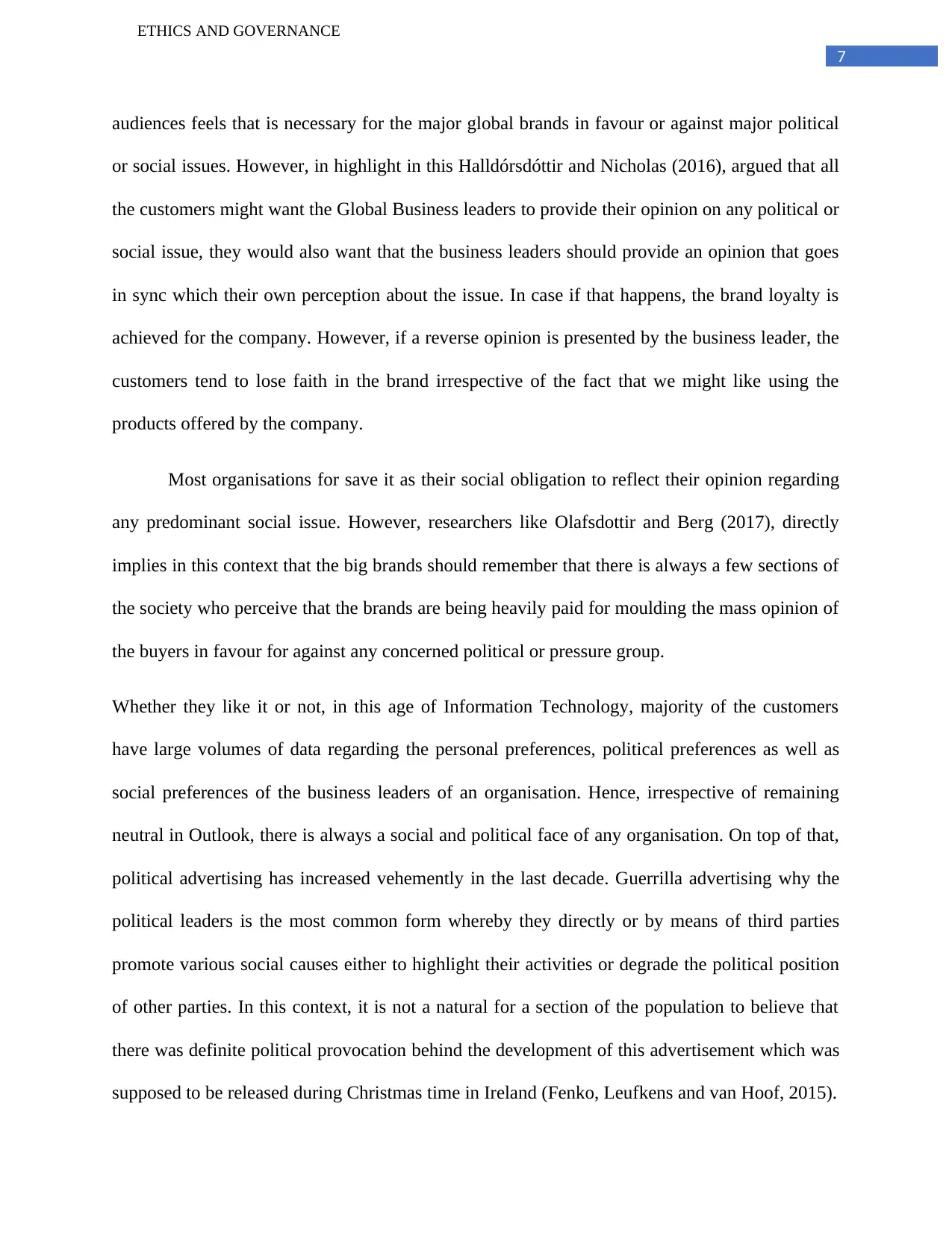
7
ETHICS AND GOVERNANCE
audiences feels that is necessary for the major global brands in favour or against major political
or social issues. However, in highlight in this Halldórsdóttir and Nicholas (2016), argued that all
the customers might want the Global Business leaders to provide their opinion on any political or
social issue, they would also want that the business leaders should provide an opinion that goes
in sync which their own perception about the issue. In case if that happens, the brand loyalty is
achieved for the company. However, if a reverse opinion is presented by the business leader, the
customers tend to lose faith in the brand irrespective of the fact that we might like using the
products offered by the company.
Most organisations for save it as their social obligation to reflect their opinion regarding
any predominant social issue. However, researchers like Olafsdottir and Berg (2017), directly
implies in this context that the big brands should remember that there is always a few sections of
the society who perceive that the brands are being heavily paid for moulding the mass opinion of
the buyers in favour for against any concerned political or pressure group.
Whether they like it or not, in this age of Information Technology, majority of the customers
have large volumes of data regarding the personal preferences, political preferences as well as
social preferences of the business leaders of an organisation. Hence, irrespective of remaining
neutral in Outlook, there is always a social and political face of any organisation. On top of that,
political advertising has increased vehemently in the last decade. Guerrilla advertising why the
political leaders is the most common form whereby they directly or by means of third parties
promote various social causes either to highlight their activities or degrade the political position
of other parties. In this context, it is not a natural for a section of the population to believe that
there was definite political provocation behind the development of this advertisement which was
supposed to be released during Christmas time in Ireland (Fenko, Leufkens and van Hoof, 2015).
ETHICS AND GOVERNANCE
audiences feels that is necessary for the major global brands in favour or against major political
or social issues. However, in highlight in this Halldórsdóttir and Nicholas (2016), argued that all
the customers might want the Global Business leaders to provide their opinion on any political or
social issue, they would also want that the business leaders should provide an opinion that goes
in sync which their own perception about the issue. In case if that happens, the brand loyalty is
achieved for the company. However, if a reverse opinion is presented by the business leader, the
customers tend to lose faith in the brand irrespective of the fact that we might like using the
products offered by the company.
Most organisations for save it as their social obligation to reflect their opinion regarding
any predominant social issue. However, researchers like Olafsdottir and Berg (2017), directly
implies in this context that the big brands should remember that there is always a few sections of
the society who perceive that the brands are being heavily paid for moulding the mass opinion of
the buyers in favour for against any concerned political or pressure group.
Whether they like it or not, in this age of Information Technology, majority of the customers
have large volumes of data regarding the personal preferences, political preferences as well as
social preferences of the business leaders of an organisation. Hence, irrespective of remaining
neutral in Outlook, there is always a social and political face of any organisation. On top of that,
political advertising has increased vehemently in the last decade. Guerrilla advertising why the
political leaders is the most common form whereby they directly or by means of third parties
promote various social causes either to highlight their activities or degrade the political position
of other parties. In this context, it is not a natural for a section of the population to believe that
there was definite political provocation behind the development of this advertisement which was
supposed to be released during Christmas time in Ireland (Fenko, Leufkens and van Hoof, 2015).
Paraphrase This Document
Need a fresh take? Get an instant paraphrase of this document with our AI Paraphraser
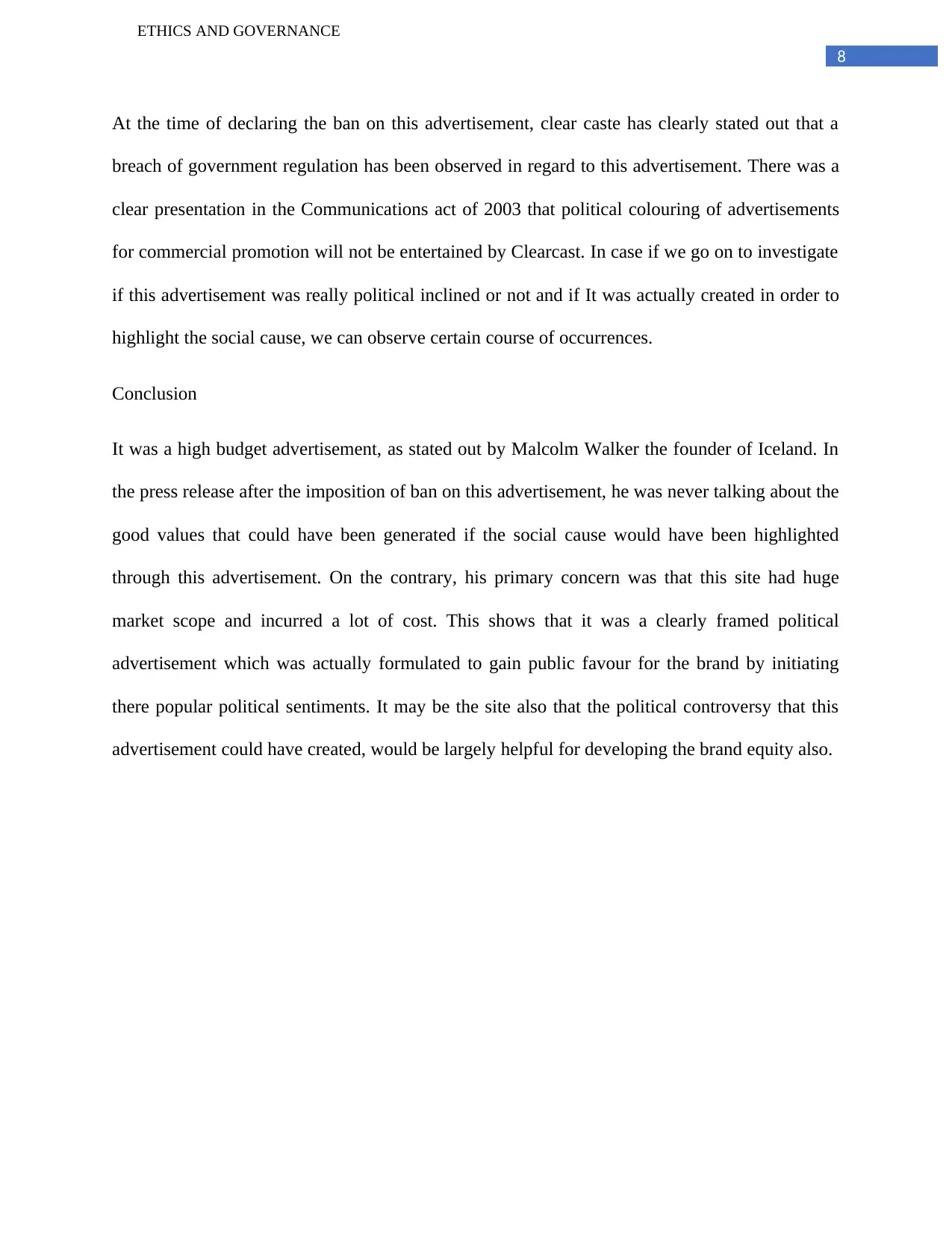
8
ETHICS AND GOVERNANCE
At the time of declaring the ban on this advertisement, clear caste has clearly stated out that a
breach of government regulation has been observed in regard to this advertisement. There was a
clear presentation in the Communications act of 2003 that political colouring of advertisements
for commercial promotion will not be entertained by Clearcast. In case if we go on to investigate
if this advertisement was really political inclined or not and if It was actually created in order to
highlight the social cause, we can observe certain course of occurrences.
Conclusion
It was a high budget advertisement, as stated out by Malcolm Walker the founder of Iceland. In
the press release after the imposition of ban on this advertisement, he was never talking about the
good values that could have been generated if the social cause would have been highlighted
through this advertisement. On the contrary, his primary concern was that this site had huge
market scope and incurred a lot of cost. This shows that it was a clearly framed political
advertisement which was actually formulated to gain public favour for the brand by initiating
there popular political sentiments. It may be the site also that the political controversy that this
advertisement could have created, would be largely helpful for developing the brand equity also.
ETHICS AND GOVERNANCE
At the time of declaring the ban on this advertisement, clear caste has clearly stated out that a
breach of government regulation has been observed in regard to this advertisement. There was a
clear presentation in the Communications act of 2003 that political colouring of advertisements
for commercial promotion will not be entertained by Clearcast. In case if we go on to investigate
if this advertisement was really political inclined or not and if It was actually created in order to
highlight the social cause, we can observe certain course of occurrences.
Conclusion
It was a high budget advertisement, as stated out by Malcolm Walker the founder of Iceland. In
the press release after the imposition of ban on this advertisement, he was never talking about the
good values that could have been generated if the social cause would have been highlighted
through this advertisement. On the contrary, his primary concern was that this site had huge
market scope and incurred a lot of cost. This shows that it was a clearly framed political
advertisement which was actually formulated to gain public favour for the brand by initiating
there popular political sentiments. It may be the site also that the political controversy that this
advertisement could have created, would be largely helpful for developing the brand equity also.
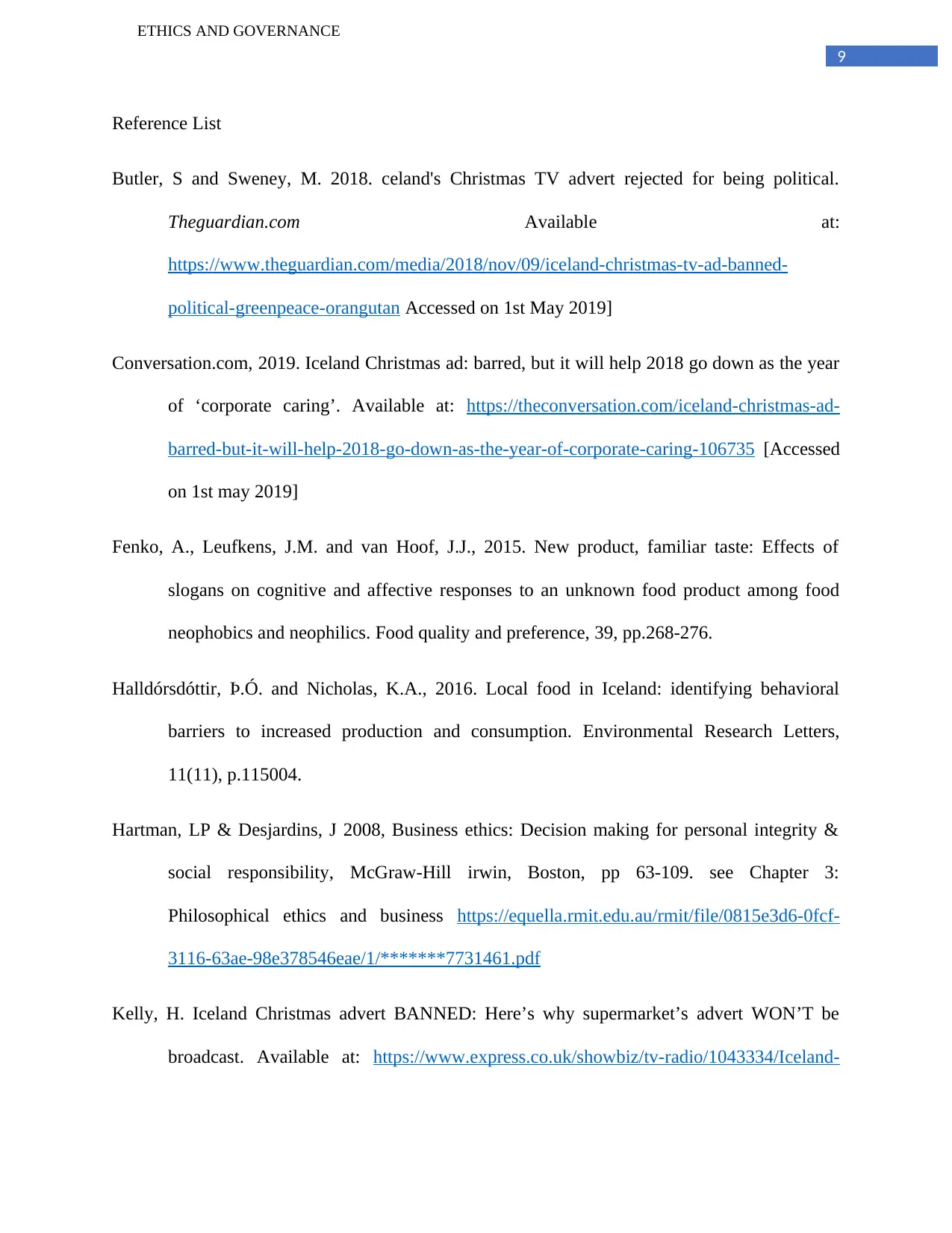
9
ETHICS AND GOVERNANCE
Reference List
Butler, S and Sweney, M. 2018. celand's Christmas TV advert rejected for being political.
Theguardian.com Available at:
https://www.theguardian.com/media/2018/nov/09/iceland-christmas-tv-ad-banned-
political-greenpeace-orangutan Accessed on 1st May 2019]
Conversation.com, 2019. Iceland Christmas ad: barred, but it will help 2018 go down as the year
of ‘corporate caring’. Available at: https://theconversation.com/iceland-christmas-ad-
barred-but-it-will-help-2018-go-down-as-the-year-of-corporate-caring-106735 [Accessed
on 1st may 2019]
Fenko, A., Leufkens, J.M. and van Hoof, J.J., 2015. New product, familiar taste: Effects of
slogans on cognitive and affective responses to an unknown food product among food
neophobics and neophilics. Food quality and preference, 39, pp.268-276.
Halldórsdóttir, Þ.Ó. and Nicholas, K.A., 2016. Local food in Iceland: identifying behavioral
barriers to increased production and consumption. Environmental Research Letters,
11(11), p.115004.
Hartman, LP & Desjardins, J 2008, Business ethics: Decision making for personal integrity &
social responsibility, McGraw-Hill irwin, Boston, pp 63-109. see Chapter 3:
Philosophical ethics and business https://equella.rmit.edu.au/rmit/file/0815e3d6-0fcf-
3116-63ae-98e378546eae/1/*******7731461.pdf
Kelly, H. Iceland Christmas advert BANNED: Here’s why supermarket’s advert WON’T be
broadcast. Available at: https://www.express.co.uk/showbiz/tv-radio/1043334/Iceland-
ETHICS AND GOVERNANCE
Reference List
Butler, S and Sweney, M. 2018. celand's Christmas TV advert rejected for being political.
Theguardian.com Available at:
https://www.theguardian.com/media/2018/nov/09/iceland-christmas-tv-ad-banned-
political-greenpeace-orangutan Accessed on 1st May 2019]
Conversation.com, 2019. Iceland Christmas ad: barred, but it will help 2018 go down as the year
of ‘corporate caring’. Available at: https://theconversation.com/iceland-christmas-ad-
barred-but-it-will-help-2018-go-down-as-the-year-of-corporate-caring-106735 [Accessed
on 1st may 2019]
Fenko, A., Leufkens, J.M. and van Hoof, J.J., 2015. New product, familiar taste: Effects of
slogans on cognitive and affective responses to an unknown food product among food
neophobics and neophilics. Food quality and preference, 39, pp.268-276.
Halldórsdóttir, Þ.Ó. and Nicholas, K.A., 2016. Local food in Iceland: identifying behavioral
barriers to increased production and consumption. Environmental Research Letters,
11(11), p.115004.
Hartman, LP & Desjardins, J 2008, Business ethics: Decision making for personal integrity &
social responsibility, McGraw-Hill irwin, Boston, pp 63-109. see Chapter 3:
Philosophical ethics and business https://equella.rmit.edu.au/rmit/file/0815e3d6-0fcf-
3116-63ae-98e378546eae/1/*******7731461.pdf
Kelly, H. Iceland Christmas advert BANNED: Here’s why supermarket’s advert WON’T be
broadcast. Available at: https://www.express.co.uk/showbiz/tv-radio/1043334/Iceland-
⊘ This is a preview!⊘
Do you want full access?
Subscribe today to unlock all pages.

Trusted by 1+ million students worldwide
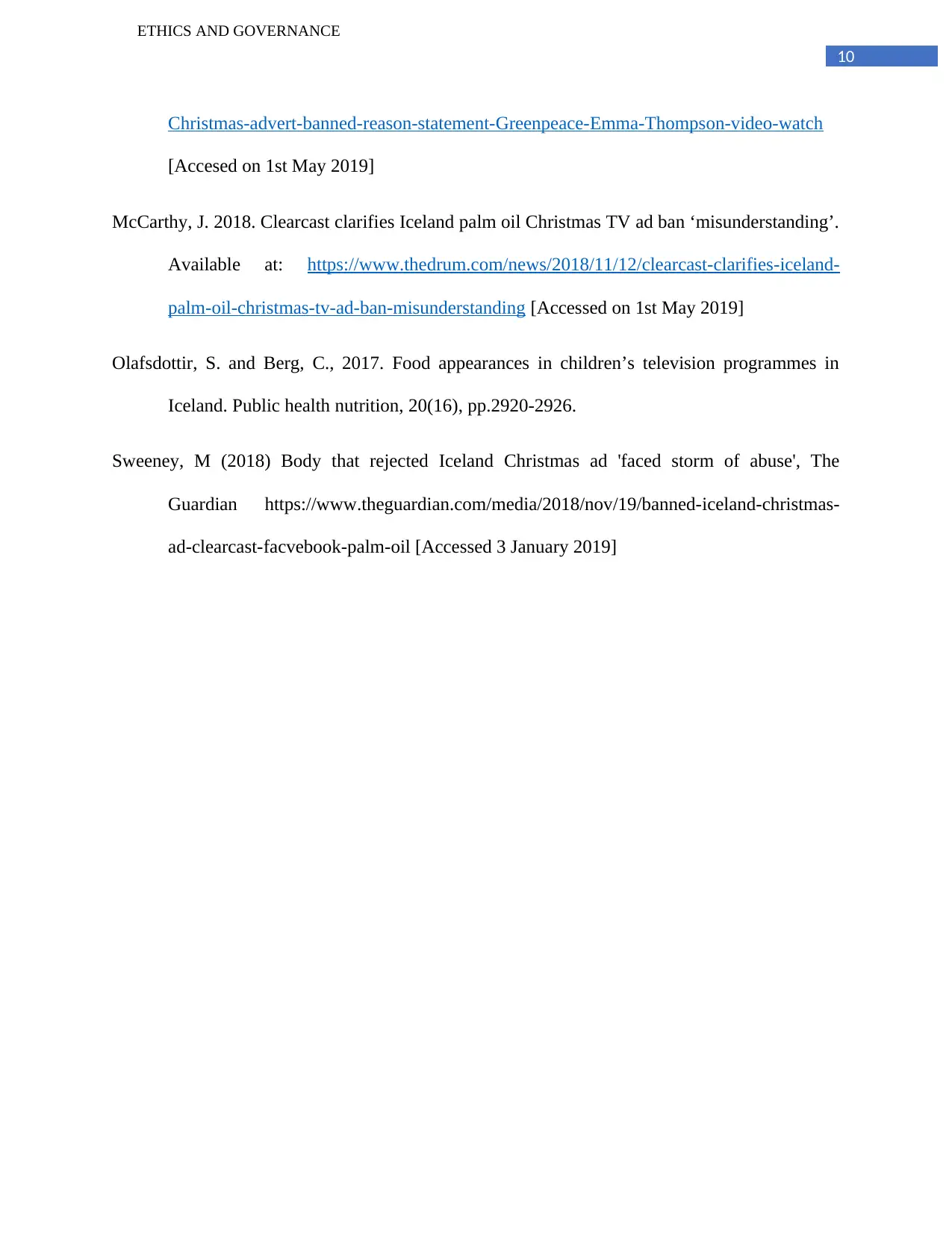
10
ETHICS AND GOVERNANCE
Christmas-advert-banned-reason-statement-Greenpeace-Emma-Thompson-video-watch
[Accesed on 1st May 2019]
McCarthy, J. 2018. Clearcast clarifies Iceland palm oil Christmas TV ad ban ‘misunderstanding’.
Available at: https://www.thedrum.com/news/2018/11/12/clearcast-clarifies-iceland-
palm-oil-christmas-tv-ad-ban-misunderstanding [Accessed on 1st May 2019]
Olafsdottir, S. and Berg, C., 2017. Food appearances in children’s television programmes in
Iceland. Public health nutrition, 20(16), pp.2920-2926.
Sweeney, M (2018) Body that rejected Iceland Christmas ad 'faced storm of abuse', The
Guardian https://www.theguardian.com/media/2018/nov/19/banned-iceland-christmas-
ad-clearcast-facvebook-palm-oil [Accessed 3 January 2019]
ETHICS AND GOVERNANCE
Christmas-advert-banned-reason-statement-Greenpeace-Emma-Thompson-video-watch
[Accesed on 1st May 2019]
McCarthy, J. 2018. Clearcast clarifies Iceland palm oil Christmas TV ad ban ‘misunderstanding’.
Available at: https://www.thedrum.com/news/2018/11/12/clearcast-clarifies-iceland-
palm-oil-christmas-tv-ad-ban-misunderstanding [Accessed on 1st May 2019]
Olafsdottir, S. and Berg, C., 2017. Food appearances in children’s television programmes in
Iceland. Public health nutrition, 20(16), pp.2920-2926.
Sweeney, M (2018) Body that rejected Iceland Christmas ad 'faced storm of abuse', The
Guardian https://www.theguardian.com/media/2018/nov/19/banned-iceland-christmas-
ad-clearcast-facvebook-palm-oil [Accessed 3 January 2019]
1 out of 10
Related Documents
Your All-in-One AI-Powered Toolkit for Academic Success.
+13062052269
info@desklib.com
Available 24*7 on WhatsApp / Email
![[object Object]](/_next/static/media/star-bottom.7253800d.svg)
Unlock your academic potential
Copyright © 2020–2026 A2Z Services. All Rights Reserved. Developed and managed by ZUCOL.





